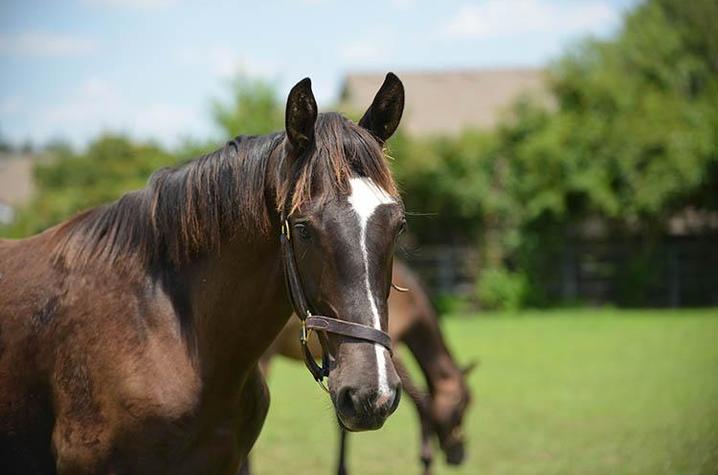UK Ag Equine Programs to Host 10th Annual Equine Research Showcase Virtually

LEXINGTON, Ky. (Nov. 30, 2020) — University of Kentucky Ag Equine Programs will host its 10th annual UK Equine Showcase virtually through four sessions over four dates in January and February 2021.The event will continue the “life journey” theme initiated last year and will emphasize weanling to yearling horses, presenting both completed and work-in-progress projects relevant to this age group.
“We are excited to once again put together an excellent set of lectures and continuing education featuring many of our colleagues,” said Emma Adam, assistant professor and research and industry liaison at the Gluck Equine Research Center. “The way our industry is helped through the resources we have at the University of Kentucky is unparalleled.”
Due to the current pandemic, the event has moved to a virtual format. Organizers wanted to continue to provide information and continuing education opportunities in 2021 rather than postpone for a year. Recognizing that staying engaged for long periods of time via a virtual format is challenging, organizers chose to break up the annual event into several shorter sessions over the course of a few weeks.
Jan. 5, 6-7:30 p.m. EST, will focus on musculoskeletal issues and include the following topics and speakers:
- Bisphosphonates, NSAIDs and other medicines in the juvenile horse with Scott Stanley, professor of analytical chemistry at the Gluck Equine Research Center.
- Sesamoid bone maturation by the laboratory of James MacLeod, director of UK Ag Equine Programs and John S. and Elizabeth A. Knight Chair and professor of veterinary science at the Gluck Center.
- Bone pathology in Wobbler’s Syndrome with Jennifer Janes, assistant professor of anatomic pathology at UK’s Veterinary Diagnostic Laboratory (VDL).
Jan. 19, 6-7:30 p.m. EST, will focus on nutrition and pasture topics and include the following information and speakers:
- Mineral requirements for a growing horse with Mieke Brummer-Holder, assistant professor in the Department of Animal and Food Sciences.
- Amino acids and protein synthesis in the growing horse with Kristine Urschel, associate professor in the Department of Animal and Food Sciences.
- UK Horse Pasture Evaluation Program information with Krista Lea, program coordinator, and Ray Smith, professor and extension forage specialist, both from the Department of Plant and Soil Sciences.
Feb. 2, 6-7:30 p.m. EST, will focus on parasitology, vaccination immunology and causes of mortality and include the following information and speakers:
- Vaccination, immunity and immune response in weanlings with David Horohov, chair of the Department of Veterinary Science, director of and Jes E. and Clementine M. Schlaikjer Endowed Chair at the Gluck Center.
- Parasitology as it pertains to weanlings and yearlings with Martin Nielsen, Schlaikjer Professor of Equine Infectious Disease at the Gluck Center.
- Common(est) causes of mortality in this age group with Laura Kennedy, assistant professor and veterinary pathologist at the UK VDL.
Feb. 9, 6-7:30 p.m. EST will cover hot topics in a mini session format of 10 minutes each, with updates about equine research literature resources at UK, nocardioform placentitis summary from 2020, COVID-19 economic impact and the next equine survey, lab updates, Equine Biological Passport update, genetic diversity project, updates on equine surface research, important parasitology updates and more.
"This is a unique and special outreach event. The purpose is to showcase some of what is happening in the UK College of Agriculture, Food and Environment in terms of scientific discovery and service efforts relevant to the young horse,” MacLeod said. “Participants will hopefully gain new information they can apply to their programs, but importantly also a greater appreciation for some of the critical questions being addressed at UK, why these issues are important and where the cutting edge of research is on a number of very interesting topics. This annual program, now reaching 10 years, highlights our commitment to advance research, service and teaching for the benefit of horses and the equine community.”
The UK Equine Showcase is open to veterinarians, owners and managers of all horse breeds or anyone with an interest in learning more about foals and horse management. Its virtual format means that this opportunity is open to attendees from across the U.S. and even world.
The cost to attend all sessions is $25 until the early bird registration deadline of Jan. 5. This package will include a PDF of the presentations and access to a recording of the sessions after the event has concluded. Attendees can also opt to attend only one or two of the sessions they are interested in. Individual event registration will also be available for $10 each. There are special rates for farms interested in having multiple employees attend. Students from any university can participate for free. Please contact equine@uky.edu for help in registering for those discounted or free sessions. Continuing education credit for veterinarians and veterinary technicians is pending approval by the Kentucky Board of Veterinary Examiners. Register at www.eventbrite.com/e/10th-annual-uk-equine-showcase-virtual-event-tickets-123079454963. Contact equine@uky.edu with questions about the event or with help registering.
UK is also accepting sponsor participation for the showcase. Presenting opportunities are available to participating organizations on a first-come, first-served basis. Email equine@uky.edu for details.
As the state’s flagship, land-grant institution, the University of Kentucky exists to advance the Commonwealth. We do that by preparing the next generation of leaders — placing students at the heart of everything we do — and transforming the lives of Kentuckians through education, research and creative work, service and health care. We pride ourselves on being a catalyst for breakthroughs and a force for healing, a place where ingenuity unfolds. It's all made possible by our people — visionaries, disruptors and pioneers — who make up 200 academic programs, a $476.5 million research and development enterprise and a world-class medical center, all on one campus.




